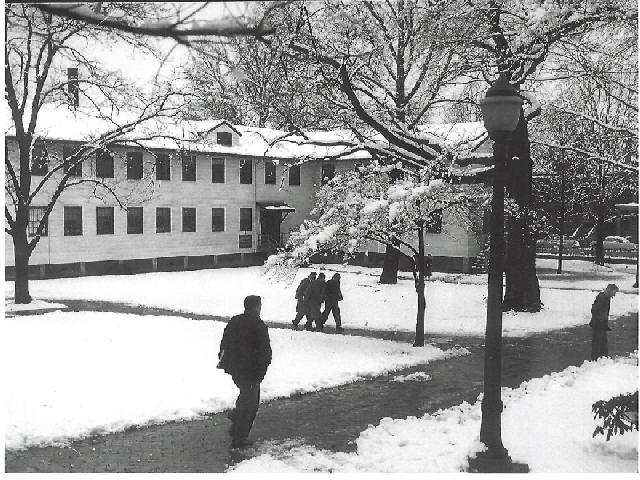
Old Main Annex
------------------------------------------------------------------------------------------------------

Marshall University Library Short
of classrooms when returning World War II
veterans flocked to the campus, Marshall in 1947 secured a war surplus
military barracks and erected it next to Old Main. The structure, shown
here on a snowy day in 1954, was described as “temporary.” In fact,
it would be used for classes for the next 20 years.
------------------------------------------------------------------------------------------------------
HUNTINGTON — With the end of World War II in
1945, the nation's college
campuses were swamped by returning veterans using their education benefits
under the federal GI Bill. Marshall College was no exception.
The enrollment boom left Marshall woefully short of classrooms.
Responding to a request from Marshall, Uncle Sam stepped
in to help.
A former U.S. Navy barracks in Norfolk, Va., was no longer needed,
so it was dismantled, shipped to Huntington and reassembled next
to Old Main. When it was erected in 1947, the former barracks -
officially known as Old Main Annex - was described as a
"temporary" structure. In fact, it would be used for a
variety of classes for the next 20 years, until
the construction of Smith Hall in 1967.
The surge in post-war enrollment also created a
tremendous housing shortage,
made even more critical by the fact that many of the returning vets were
married, meaning they had to find housing not just for themselves
but also for their families. As a result, numerous campus area
garages and other structures were turned into makeshift
rental apartments. But that still left hundreds
of vets without housing.
Again, Marshall appealed to the federal government for
help. The Federal
Housing Administration responded by sending war surplus pre-fabricated
military housing that was erected on Donald Court in the city's Enslow
Park neighborhood. The federal government also sent Marshall
house trailers for use as student housing. Set up on the
intramural field adjacent to the Lab School at the
eastern end of the campus, the trailer complex
was dubbed Green Village. The name
was a great deal prettier than
the ugly-looking trailers.
Members of the Marshall faculty found the returning
veterans to be far
more mature and studious than pre-war Marshall students. Little
interested in the frills of campus life, they were intent on
earning their degrees as quickly as possible and getting
on with their lives. Many graduated in three years,
more than justifying the government's
investment in their education.
-----------------------------------------------------------
Note: This Article and picture appeared in the Herald-Dispatch Newspaper on Jan. 21, 2019.
-----------------------------------------------------------
[ Back ]